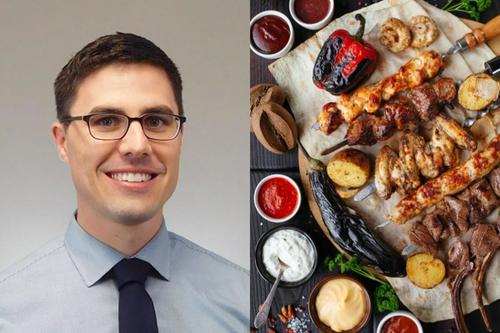
The holiday season is filled with parties and family gatherings. However, along with the joy of being with loved ones and friends, these gatherings are also typically filled with excessive amounts of food and beverage. That can lead to overindulgence and take a toll on your health, particularly your gastrointestinal (GI) system.
Levi Teigen, an assistant professor in the Division of Gastroenterology, Hepatology and Nutrition at the University of Minnesota Medical School and faculty member in the University of Minnesota Microbiota Therapeutics Program, is available to comment on the impact of eating excessive amounts of unhealthy food and beverages on your gut health this holiday season.
Levi Teigen, Ph.D, RD
On unhealthy food:
“The holiday season is associated with overeating. The biggest negative impact on your gut health stems from larger portion sizes. It doesn't necessarily matter what type of food it is, it’s the overeating aspect that matters most. It can produce a variety of symptoms such as gas, bloating and altered bowel movement patterns.”
“However, the types of foods that you're eating make a difference as well. People will likely be consuming more fatty foods or concentrated sweets. Higher fats can be challenging for our bodies to digest. Same for sweets that are filled with sugar.”
On liquid and food interactions:
“Foods with lots of fats, processed foods and concentrated sweets or sugars can definitely cause gut issues. Sugary beverages such as soda, diet sodas, juices and alcohol are also culprits for GI issues. Same goes for excessive amounts of caffeine.”
“Besides GI irritation, overindulgence can potentially result in brain fog, general malaise and sleep issues. If overindulgence is limited to the holiday season, there isn’t a major concern for long term effects on your body as long as you get back on track.”
On staying healthy:
“The key is moderation, moderation, moderation. Too much of anything is never good. That certainly applies to eating and drinking during the holidays. That doesn’t mean you can’t indulge, just try to do it in moderation.”
“Try to keep some soluble fiber rich foods such as oatmeal, fruits (bananas or berries), cooked veggies (carrots, potatoes or squash), nuts or nut butters, and yogurt with fruit or the addition of 1-2 tablespoons ground flaxseed or chia seeds in your diet.”
“It’s also very important to remain active. It can help burn calories and aid in regular bowel movements. Go to the gym, take a walk or get outside with family, friends and loved ones.”
Levi Teigen, Ph.D., RD, has worked as a clinical dietitian at facilities across the U.S. His current research efforts are aimed at the optimization of patient care and outcomes through enhancement of clinical nutrition care. Teigen’s current research is focused on the nutritional assessment and care of individuals with inflammatory bowel disease, irritable bowel syndrome and support of patients following intestinal microbiota transplant.
About the University of Minnesota Medical School
The University of Minnesota Medical School is at the forefront of learning and discovery, transforming medical care and educating the next generation of physicians. Our graduates and faculty produce high-impact biomedical research and advance the practice of medicine. We acknowledge that the U of M Medical School, both the Twin Cities campus and Duluth campus, is located on traditional, ancestral and contemporary lands of the Dakota and the Ojibwe, and scores of other Indigenous people, and we affirm our commitment to tribal communities and their sovereignty as we seek to improve and strengthen our relations with tribal nations. Learn more at med.umn.edu.
- Categories:
- Health
- Health conditions
- Medical




